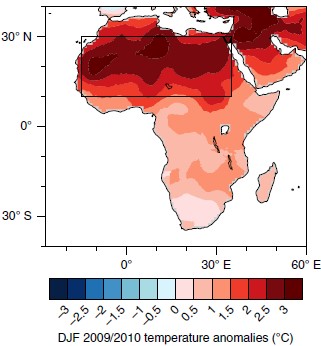Pay-backs to Africa from the Paris Agreement's Temperature Targets
Date:2018-05-16
Africa is arguably one of the regions most vulnerable to adverse impacts of climate change. With average temperatures in Africa rising faster than the global average causing increases in severity and frequency of extreme climate events, it is vital that future changes of these extremes be understood. However, projected changes of climate extremes in Africa remain little explored. Particularly in the context of the Paris Agreement’s goal to limit global warming to below 2°C and pursue efforts to further limit warming to 1.5 °C.
In a recent study published in Nat. Clim. Chang., PhD candidate Shingirai NANGOMBE, his supervisor Prof. ZHOU Tianjun and colleagues from the Institute of Atmospheric Physics, Chinese Academy of Sciences investigate potential benefits to Africa of limiting global warming to 1.5°C instead of 2°C. A coupled Community Earth System Model’s (CESM) low warming experiments were used with periods 1961-1990, 1976-2005 and 2071-2100 representing baseline, present-day and future warming levels respectively. They report that events similar to those of December–February 1991/1992 over southern Africa and those of 2009/2010 over North Africa might be reduced by 25% and 20% respectively if warming is constrained to half a degree lower than 2 °C.

Observed December–February 2009/2010 temperature anomalies over Africa. The black box on the map denotes the North Africa area used in the study where temperatures were extremely high. Anomalies are relative to the 1961–1990 period. (Image by Shingirai NANGOMBE)
Since sub-Saharan Africa agriculture is mainly rain-fed, the study also investigated future likelihoods of historical record-breaking rainfall extremes. Specifically, the 1991/992 extreme drought observed in southern Africa. High temperatures (1.1°C above baseline) and precipitation deficit (43% below baseline) of that year were used as drought indicators. The study found that regardless of the insignificant precipitation change being projected between 1.5°C and 2°C scenarios, excessive warming alone projected might increase chances of occurrence of similar droughts in warmer worlds. However, the February 2000 extremely high rainfall (120% above baseline) recorded in southeast Africa associated with tropical cyclone Eline, was projected to remain rare under 1.5°C and 2°C scenarios.
"In our study, the CESM model simulations suggest that continued efforts to limit warming to 0.5 °C lower than 2°C offer substantial paybacks in terms of reducing heat extremes and their associated socio-economic impacts across Africa." says NANGOMBE.
Reference: Nangombe Shingirai, Tianjun Zhou*, Wenxia Zhang, Bo Wu, Shuai Hu, Liwei Zou & Donghuan Li: Record-breaking climate extremes in Africa under stabilized 1.5?°C and 2?°C global warming scenarios. Nature Climate Change (2018) doi:10.1038/s41558-018-0145-6. https://www.nature.com/articles/s41558-018-0145-6
Contact: LIN Zheng, jennylin@mail.iap.ac.cn
